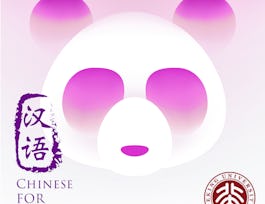Yunnan, abbreviated as Yun and called Dian for short, is a multi-ethnic province which has historically been situated in the southwest frontier of China. Over time, the ethnic minorities evolved into splendid cultures, each with their own unique social life, religious beliefs and customs. The course is taught in English and provides an introduction to 25 ethnic minorities in Yunnan Province, namely the Yi, Bai, Hani, Dai, Zhuang, Miao, Hui, Lisu, Lahu, Wa, Naxi, Yao, Jingpo, Tibetan, Bulang, Buyi, Achang, Pumi, Mongolian, Nu, Jinuo, De'ang, Shui, Man and Dulong nationalities. By participating in this course, you will gain fascinating insights into the culture of each ethnic group as we look in turn together at their geographical location, population distribution, language, costumes and diet, festivals and holidays, religious beliefs, literature and art, etc. This course aims to improve your English and bring these amazing people groups in Yunnan Province to life. we are sure you will thoroughly enjoy this course.



Expérience recommandée
Détails à connaître

Ajouter à votre profil LinkedIn
8 devoirs
Découvrez comment les employés des entreprises prestigieuses maîtrisent des compétences recherchées


Obtenez un certificat professionnel
Ajoutez cette qualification à votre profil LinkedIn ou à votre CV
Partagez-le sur les réseaux sociaux et dans votre évaluation de performance

Il y a 8 modules dans ce cours
In Unit One, you are going to learn the cultural aspects such as the geographical location, population distribution, language, costumes and diet, festivals and holidays, religious beliefs, literature and art of three ethnic groups in the upper reaches of Nujiang River: Nu Nationality, Dulong Nationality and Lisu Nationality. At the end of the unit, there will be a test and two questions for discussion.
Inclus
8 vidéos1 devoir1 sujet de discussion
In Unit Two, you are going to learn the cultural aspects such as the geographical location, population distribution, language, costumes and diet, festivals and holidays, religious beliefs, literature and art of three ethnic groups in the lower reaches of Nujiang River: Deang Nationality, Jingpo Nationality and Achang Nationality. At the end of the unit, there will be a test and two questions for discussion.
Inclus
3 vidéos1 devoir2 sujets de discussion
In Unit Three, you are going to learn the cultural aspects such as the geographical location, population distribution, language, costumes and diet, festivals and holidays, religious beliefs, literature and art of three ethnic groups in the region of Three Parallel Rivers: Tibetan Nationality, Naxi Nationality and Pumi Nationality. At the end of the unit, there will be a test and two questions for discussion.
Inclus
6 vidéos1 lecture1 devoir2 sujets de discussion
In Unit Four, you are going to learn the cultural aspects such as the geographical location, population distribution, language, costumes and diet, festivals and holidays, religious beliefs, literature and art of three ethnic groups in Lancang River Basin: Dai Nationality, Hani Nationality and Lahu Nationality. At the end of the unit, there will be a test and two questions for discussion.
Inclus
6 vidéos1 devoir
In Unit Five, you are going to learn the cultural aspects such as the geographical location, population distribution, language, costumes and diet, festivals and holidays, religious beliefs, literature and art of another three ethnic groups in Lancang River Basin: Bulang Nationality, Jinuo Nationality and Wa Nationality. At the end of the unit, there will be a test and two questions for discussion.
Inclus
6 vidéos1 devoir2 sujets de discussion
In Unit Six, you are going to learn the cultural aspects such as the geographical location, population distribution, language, costumes and diet, festivals and holidays, religious beliefs, literature and art of three ethnic groups in central and eastern Yunnan Province: Bai Nationality, Yi Nationality and Mongol Nationality. At the end of the unit, there will be a test and two questions for discussion.
Inclus
6 vidéos1 devoir2 sujets de discussion
In Unit Seven, you are going to learn the cultural aspects such as the geographical location, population distribution, language, costumes and diet, festivals and holidays, religious beliefs, literature and art of another three ethnic groups in central and eastern Yunnan Province: Man Nationality, Hui Nationality and Zhuang Nationality. At the end of the unit, there will be a test and two questions for discussion.
Inclus
4 vidéos1 devoir2 sujets de discussion
In Unit Eight, you are going to learn the cultural aspects such as the geographical location, population distribution, language, costumes and diet, festivals and holidays, religious beliefs, literature and art of the last four ethnic groups in central and eastern Yunnan Province: Miao Nationality, Yao Nationality, Buyi Nationality and Shui Nationality. At the end of the unit, there will be a test and two questions for discussion
Inclus
9 vidéos1 devoir2 sujets de discussion
Instructeur

Offert par
Recommandé si vous êtes intéressé(e) par Learning English

Pontificia Universidad Católica de Chile

Peking University

Shanghai Jiao Tong University

Shanghai Jiao Tong University
Pour quelles raisons les étudiants sur Coursera nous choisissent-ils pour leur carrière ?





Ouvrez de nouvelles portes avec Coursera Plus
Accès illimité à 10,000+ cours de niveau international, projets pratiques et programmes de certification prêts à l'emploi - tous inclus dans votre abonnement.
Faites progresser votre carrière avec un diplôme en ligne
Obtenez un diplôme auprès d’universités de renommée mondiale - 100 % en ligne
Rejoignez plus de 3 400 entreprises mondiales qui ont choisi Coursera pour les affaires
Améliorez les compétences de vos employés pour exceller dans l’économie numérique
Foire Aux Questions
Access to lectures and assignments depends on your type of enrollment. If you take a course in audit mode, you will be able to see most course materials for free. To access graded assignments and to earn a Certificate, you will need to purchase the Certificate experience, during or after your audit. If you don't see the audit option:
The course may not offer an audit option. You can try a Free Trial instead, or apply for Financial Aid.
The course may offer 'Full Course, No Certificate' instead. This option lets you see all course materials, submit required assessments, and get a final grade. This also means that you will not be able to purchase a Certificate experience.
When you purchase a Certificate you get access to all course materials, including graded assignments. Upon completing the course, your electronic Certificate will be added to your Accomplishments page - from there, you can print your Certificate or add it to your LinkedIn profile. If you only want to read and view the course content, you can audit the course for free.
You will be eligible for a full refund until two weeks after your payment date, or (for courses that have just launched) until two weeks after the first session of the course begins, whichever is later. You cannot receive a refund once you’ve earned a Course Certificate, even if you complete the course within the two-week refund period. See our full refund policy.


